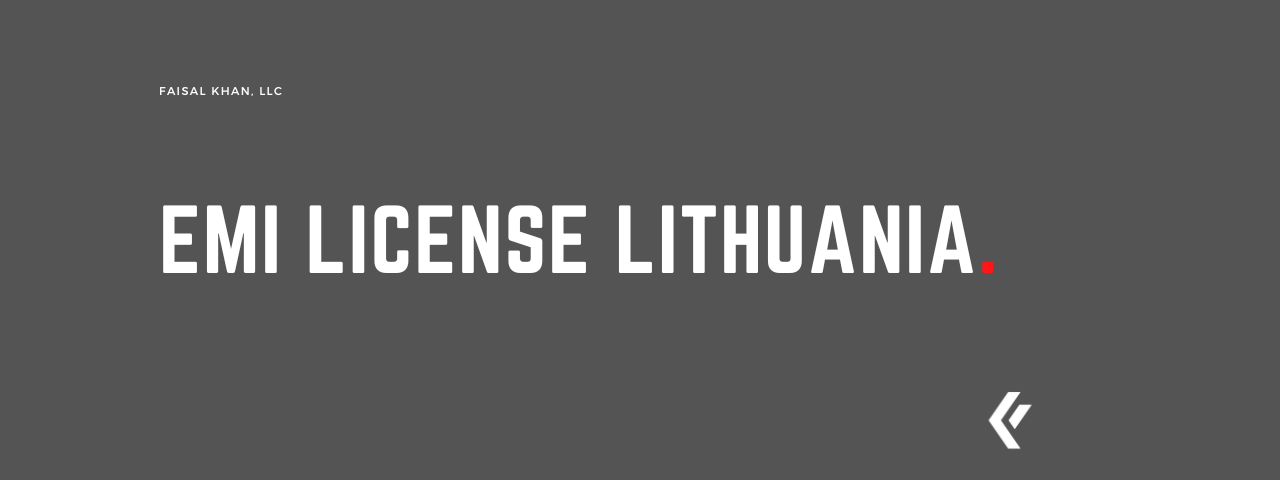What is an EMI License in Lithuania?
An Electronic Money Institution (EMI) License is a license, issued by the Bank of Lithuania, that allows an institution to issue and redeem electronic money. Electronic money (e-money) refers to a digital store of a medium of exchange on a computerized system. In order to obtain an EMI License, an applicant must submit an application to the Bank of Lithuania and also meet their set criteria. With the help of an EMI License, an institution can issue e-money, offer e-wallets and prepaid debit cards as well as retain clients’ funds. Alongside these, institutions with an EMI License can also provide the payment services that are offered by Payment Institutions, as outlined in Article 5 of the Republic of Lithuania Law on Payments.
Although it is necessary to obtain an EMI License in Lithuania in order to issue and redeem electronic money, it is certainly not difficult to do so. The EMI Licensing Process for Lithuania entails everything that is essential for one to know in order to smoothly obtain this license.
Who Regulates the EMI License in Lithuania?
The EMI License in Lithuania is regulated by the Bank of Lithuania as outlined in the Republic of Lithuania Law on Electronic Money Institutions. In accordance with Article 5 of the Republic of Lithuania Law on Payments, institutions with an EMI License in Lithuania are also allowed to provide payment services such as issuing and/or acquiring payment instruments, money transfers, and other services. In addition to that, institutions applying for an EMI License in Lithuania must comply with the Law of the Republic of Lithuania on the Prevention of Money Laundering and Terrorist Financing.
The Authorisation Process
While the process of obtaining a license is fairly lengthy, the authorization process can be broken down into three main stages:
- Submitting an application to the Supervision Service of the Bank of Lithuania. The Supervision Service checks whether the relevant documentation has been submitted and if so, sends out an acknowledgment of application acceptance. This usually takes 5-7 business days. This is the list of required documents:
- Articles of Association
- Programme of Operations
- Business Plan including Financial Forecasts for the next three years
- Proof of Initial Capital
- Proof of measures taken to safeguard the funds of electronic money holders
- Description of governance and internal control mechanisms
- Description of the procedure for monitoring, handling, and following up on operational and security incidents and security-related customer complaints
- Internal control mechanisms laid down in compliance with the Law of the Republic of Lithuania on Prevention of Money Laundering and Terrorist Financing and Regulation (EU)
- Description of the procedure for filing, monitoring, tracking, and restricting access to sensitive payment data
- description of business continuity processes
- description of principles and definitions applicable to the collection of statistical data on performance, transactions and fraud
- The application is then assessed. For applications that have no formal deficiencies, the assessment period is a minimum of 3 months. For applications where considerable documentation is missing, the Supervision Service requests the applicant to submit additional documentation. In such cases, the assessment time period is extended.
- Once the Board of the Bank of Lithuania has completed the review and assessment of the application, they will reach out to the applicant and either issue them a license or refuse their request.
Criteria to Apply for an EMI License in Lithuania
While it is understood that an institution applying for an EMI License will be willing to comply with all the requirements and legal regulations, the Bank of Lithuania requires detailed data to be submitted at the time of application. The key requirements include that submitted documentation must be compliant with the requirements of the legal acts that monitor and control the operations of Electronic Money Institutions in Lithuania and that an EMI License applicant must possess a minimum initial capital. The shareholders and management of the EMI must be qualified and of good conduct, such that they can ensure prudent management of the EMI. The plan of operations submitted to the Bank of Lithuania must be practical, such that the shareholders must be in a position to implement the plan and carry out their operations in a sound manner.
How Long Does It Take to Obtain an EMI License in Lithuania?
According to the Bank of Lithuania, a complete application that has no considerable formal deficiencies can be processed within 3 months. However, when an application is incomplete, the Supervision Service of the Bank of Lithuania will reach out to the applicant and request additional documentation.
How Can We Help?
We can certainly help you to obtain an EMI License in Lithuania. Find out more on the following pages:
—
This page was last updated on June 5, 2023.
–

